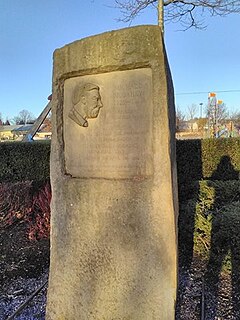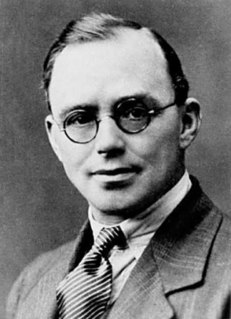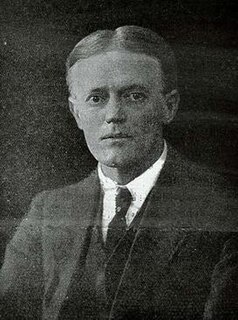Life
Born in Horncastle in Lincolnshire, Fletcher completed an apprenticeship as a baker and, after a short period working as a miner, found work at Simmersons bakery in Sheffield. There, he started a branch of the Amalgamated Union of Operative Bakers, and became its chair. [1]
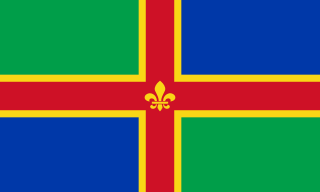
Lincolnshire is a county in eastern England, with a long coastline on the North Sea to the east. It borders Norfolk to the south east, Cambridgeshire to the south, Rutland to the south west, Leicestershire and Nottinghamshire to the west, South Yorkshire to the north west, and the East Riding of Yorkshire to the north. It also borders Northamptonshire in the south for just 20 yards (18 m), England's shortest county boundary. The county town is the city of Lincoln, where the county council has its headquarters.

Sheffield is a city and metropolitan borough in South Yorkshire, England. Historically part of the West Riding of Yorkshire, its name derives from the River Sheaf, which runs through the city. With some of its southern suburbs annexed from Derbyshire, the city has grown from its largely industrial roots to encompass a wider economic base. The population of the City of Sheffield is 577,800 (mid-2017 est.) and it is one of the eight largest regional English cities that make up the Core Cities Group. Sheffield is the third-largest English district by population. The metropolitan population of Sheffield is 1,569,000.
In 1898, Fletcher joined the Sheffield Socialist Society (SSS), and around this time, he also started a small bakery of his own. In 1902, he worked with other SSS members to form a branch of the Social Democratic Federation (SDF). He was an agreed joint Labour candidate in the 1905 local elections in Burngreave, losing by only four votes. He also began speaking regularly at open air meetings for the party. In 1910, he was fined 40 shillings for speaking in High Hazels Park; soon after, he was sentenced to 56 days in prison for speaking in Hillsborough Park. [1]
The Sheffield Socialist Society was an early revolutionary socialist organisation in Sheffield, England.
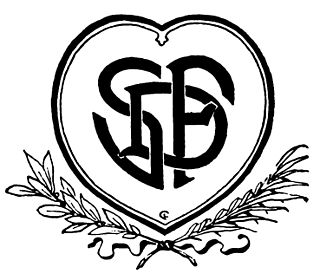
The Social Democratic Federation (SDF) was established as Britain's first organised socialist political party by H. M. Hyndman, and had its first meeting on 7 June 1881. Those joining the SDF included William Morris, George Lansbury, James Connolly and Eleanor Marx. However, Friedrich Engels, Karl Marx's long-term collaborator, refused to support Hyndman's venture. Many of its early leading members had previously been active in the Manhood Suffrage League.
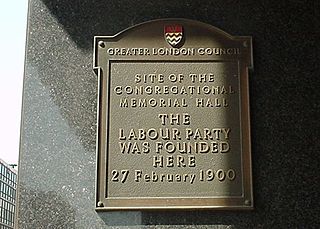
The Labour Representation Committee (LRC) was a pressure group founded in 1900 as an alliance of socialist organisations and trade unions, aimed at increasing representation for labour interests in the Parliament of the United Kingdom. The Labour Party traces its origin to the LRC's foundation.
Fletcher was elected to the executive committee of the Sheffield Trades and Labour Council in 1914, and as vice-chair in 1915. He organised anti-war rallies, and was prominent in the No Conscription Fellowship. He also played a role in supporting the Sheffield Workers' Committee, and was prominent in the bakers' national strike of 1919. [1]

The Sheffield Trades and Labour Council, usually known as the Sheffield Trades Council, is a labour organisation uniting trade unionists in Sheffield.
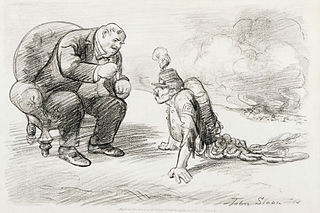
Opposition to World War I included socialist, anarchist, syndicalist, and Marxist groups on the left, as well as Christian pacifists, Canadian and Irish nationalists, women's groups, intellectuals, and rural folk. Women across the spectrum were much less supportive than men.
In 1920, Fletcher was a founder of both the Communist Party of Great Britain (CPGB) and the Sheffield National Unemployed Workers Movement. [1] [2] In 1921, he was sentenced to three months in prison on charges of sedition for speaking in favour of a miners' strike. [1] Fletcher was later appointed as the treasurer of the National Minority Movement. [3]

The Communist Party of Great Britain (CPGB) was the largest communist party in Great Britain, although it never became a mass party like those in France and Italy. It existed from 1920 to 1991.
Sedition is overt conduct, such as speech and organization, that tends toward insurrection against the established order. Sedition often includes subversion of a constitution and incitement of discontent towards, or resistance against established authority. Sedition may include any commotion, though not aimed at direct and open violence against the laws. Seditious words in writing are seditious libel. A seditionist is one who engages in or promotes the interest of sedition.
The National Minority Movement was a British organisation, established in 1924 by the Communist Party of Great Britain, which attempted to organise a radical presence within the existing trade unions. The organization was headed by longtime unionist Tom Mann and future General Secretary of the CPGB Harry Pollitt.
Although he was chair of the local CPGB branch, Fletcher was also adopted as a Labour Party candidate, and was elected to the Board of Guardians in 1922, representing Darnall, and acting as the board's treasurer. [1] He was expelled from Labour in 1928, and then stood for the CPGB in Sheffield Attercliffe at the 1929 and 1931 general elections. The Board of Guardians was abolished in 1929, and Fletcher stood for Sheffield City Council unsuccessfully that year, then in 1932 and 1935 in Manor, each time taking more than 1,000 votes. [1]
The Labour Party is a centre-left political party in the United Kingdom which has been described as an alliance of social democrats, democratic socialists and trade unionists. The party's platform emphasises greater state intervention, social justice and strengthening workers' rights.

Darnall is a suburb of eastern Sheffield, South Yorkshire, England. Darnall is approximately 3 miles (5 km) east-north-east of Sheffield city centre.

Sheffield Attercliffe was a parliamentary constituency in the City of Sheffield. It was created at the 1885 general election and abolished at the 2010 general election, when it was replaced by a new Sheffield South East constituency.
Fletcher's son, also George Fletcher, was a founder member of the Young Communist League in 1921. [4] In 1923, the two set up a new venture, running bread vans to supply their own shops, which grew into a large and profitable business, which remained in the family until it was sold to Northern Foods in 1999 for £40 million. [1]
Fletcher retired near the start of World War II, continuing to support the CPGB financially. [1] In his spare time, he was a supporter of Sheffield Wednesday F.C., and would attend their matches most Saturdays. [5] He died in Nottingham in 1958. [6]
This page is based on this
Wikipedia article Text is available under the
CC BY-SA 4.0 license; additional terms may apply.
Images, videos and audio are available under their respective licenses.











